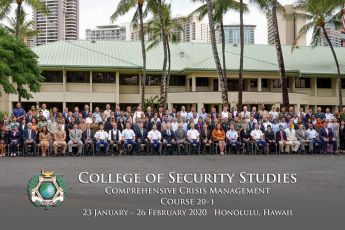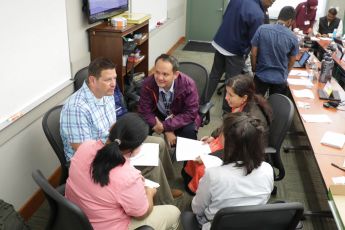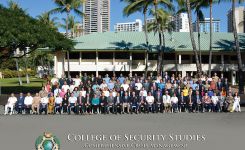- Daniel K. Inouye Asia-Pacific Center for Securi...
- First course on Comprehensive Crisis Management...
First course on Comprehensive Crisis Management of 2020 concludes
ccm-sr-col-kanobsri-gesorn.jpg

One hundred and seven Fellows from 44 locations completed the Comprehensive Crisis Management course (CCM 20-1) held at the Daniel K. Inouye Asia-Pacific Center for Security Studies (DKI APCSS) from Jan. 23 – Feb. 26, 2020.
CCM is an annual executive education program designed to educate security practitioners in problem formulation, preparedness, response and resilience. The curriculum, which runs over six weeks, enhances crisis capacity by developing a strong foundation in systems thinking followed by content on leadership, communication, negotiation and other relevant skills for enhanced crisis management and coordination.
Managing crises involves a host of government and non-government actors, the military, the private sector, and affected populations that are often ethnically, politically and culturally diverse. Crises can be overwhelmingly complex due to myriad contributing factors, such as increased threat, urgency and uncertainty, interconnected processes, diverse stakeholder motivations, resource scarcity and inability to cope.
“My exposure to other fellows has allowed me to see how seemingly correct and well-intentioned decisions can sometimes have the opposite effect in complex security environments,” said one CCM Fellow in a post-course survey. Note: The DKI APCSS non-attribution policy prohibits the use of names in this article.
The involvement of multiple ministries, national actors and foreign aid can make preparedness, response, recovery and resilience actions difficult, which speaks to the necessity of common operating platforms and well-established relationships.
“Personal friendships and deeper connections are essential for underpinning lasting relationships,” explained another Fellow.
Fellows had opportunities to analyze problems, explored factors that shape effective crisis management and developed comprehensive strategies and approaches through applied learning of best practices, case studies, small group discussions, exercises, crisis games and an individual Fellow’s Project.
Cohorts from Bhutan, Nepal, and Myanmar collaborated on group projects designed to address specific inter-agency concerns from their home countries. Fellows, who were primarily seasoned professionals from multidisciplinary backgrounds, shared their diverse expertise and experience in a participatory and trusting environment, which went a long way in assisting others in their projects and achieving learning outcomes of the course.
“The plenary panels consisting of course fellows were valuable and informative,” said another Fellow.
The course curriculum included several lunchtime lectures, to include one by Dr. Michael Gleason, The Aerospace Corporation, who discussed the new topic of “Crisis Management in Space.” Ambassador Extraordinary and Plenipotentiary Gerald M. Zackios from the Embassy of the Republic of the Marshall Islands to the United States, presented the civilian keynote. He shared his insights on leadership during crises in the context of environmental security and rising sea levels in the Pacific.
The military keynote speaker Deputy Commander, U.S. Indo-Pacific Command Lt. Gen. Michael Minihan, discussed international cooperation and competition, crisis management, and partner opportunities in the Indo-Pacific region. Additional guest speakers came from the Pacific Disaster Center, Joint Typhoon Waring Center, U.S. Coast Guard, Aspen Medical, and the RAND Corporation.
To take advantage of the class’s Oahu-based location and provide first-hand knowledge, CCM 20-1 Fellows experienced site visits to the Hawaii Emergency Management Agency, National Oceanic and Atmospheric Administration, Marine Spill Response Corporation, Center for Excellence in Disaster Management, and Defense POW/MIA Accounting Agency.
According to Course Manager Dr. Deon Canyon, this course was unique in that CORVID-19 was ever-present on the minds of all participants, who were encouraged to apply tools from the course to understand its complexity and to explore management options.
In the polling, self-rated knowledge of crisis management improved dramatically with 37% moving from ‘Very Little’ knowledge to ‘Average’ and 32% moving from ‘Average’ to ‘Advanced’ knowledge. The pre and post course surveys showed similar results. The pre-course knowledge survey average result for all areas assessed was 2.20/5.0 (range 1.44-2.61). Post-course, the average had lifted to 3.69/5.0 (range 2-76-4.02), which was a 30% improvement.
Fellows gave the course a 4.81/5.0 in their overall evaluation.
Fellows stated that they had learned skills they would be able to use in their work, they had built relationships with security practitioners from all over the region, their awareness of the value of multilateral coordination and multilateral engagement had increased, as had their awareness of critical capacity gaps in crisis management and HADR. They became more familiar with communication and coordination issues in domestic, international, civilian and military responders, and they applied this to working more effectively, rapidly and seamlessly with multiple stakeholders as they developed work plans or operating procedures or recommendations for crisis response.
Even those not expecting to learn were surprised. “I personally came as a full bowl with no space for new thoughts, but I am going back with empty mind with a lot of questions and issues to bother about…Aloha.”
Fellows identified climate-based disasters as two to three times more important than all other threats in the next five to ten years. Runners up with similar results were cybercrime, economic disruption, disease outbreaks, human migration, transnational crime and political instability. Issues hampering effective management of the above crises were, in order of importance, political interest, long-term planning, lack of accountability & transparency and inadequate resources. When fellows were asked about their capacity to manage crises in the region, 56% said it was improving, 23% said it was staying the same, 14% were not sure and only 6% said it was getting worse.
More importantly, the course Fellows renewed their commitment to improving crisis and disaster management in their country or organization through their Fellows’ Projects and now have access to the 13500 strong APCSS alumni network. An inspired fellow said, “I came to this course as a Crisis Manager but I will leave as a Crisis Leader!” All fellows agreed that another week in Hawaii would work wonders for their ability to connect, engage and improve capacity as crisis managers!
CCM is one of six formal courses at DKI APCSS. The center is a Department of Defense institute that addresses regional and global security issues. Military and civilian representatives, most from the Asia-Pacific nations and the United States, participate in a comprehensive program of executive education, professional exchanges and outreach events, both in Hawaii and throughout the Asia-Pacific region.
The Center supports U.S. Indo-Pacific Command by developing and sustaining relationships among security practitioners and national security establishments throughout the region. DKI APCSS is one of the Department of Defense’s five regional security studies centers. Its mission is to build capacity and communities of interest by educating, connecting and empowering security practitioners to advance regional security.
Since opening in 1995, more than 13,000 alumni representing over 135 countries and territories have attended courses and workshops.




